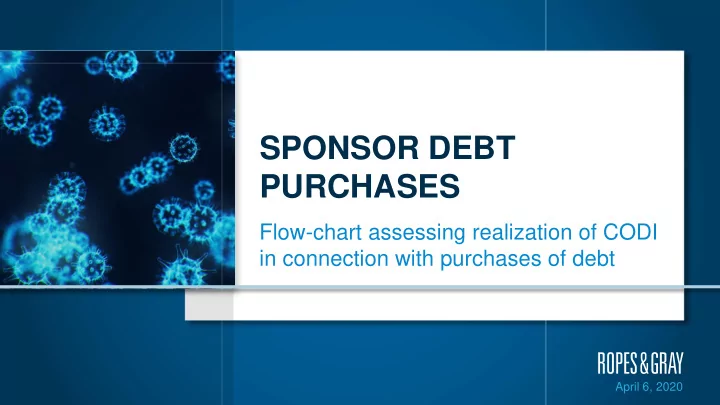

SPONSOR DEBT PURCHASES Flow-chart assessing realization of CODI in connection with purchases of debt April 6 , 2020 1
Tax Structure Flowchart – Sponsor Debt Purchases The below seeks to provide general guidance regarding U.S. federal income tax matters associated with the purchase of debt issued by affiliated businesses, but tax counsel should be consulted in connection with any specific contemplated transaction to ensure no special fact patterns are present that alter the relevant tax analysis. The below does not address certain uncommon fact patterns, such as foreign pass-through issuers. The below assumes that any debt acquired is acquired through a secondary purchase for investment purposes and not with an intent to restructure the debt. Special considerations apply if the intention is to restructure the debt — such actions give rise to additional tax consequences. The debt purchase by a partnership or corporation generally will not trigger U.S. taxable cancellation of debt income (“ CODI ”) to the issuer, and the Are the debt interest payments generally will not be subject to U.S. withholding taxes. issuer and its Yes parent entities Consult local-jurisdiction tax advisors regarding CODI, interest withholding, non-U.S. and any other local tax issues that may apply in that jurisdiction. If back- corporations? leverage is used, the purchaser structure may need to include a non-U.S. corporation for U.S. tax purposes. No Yes Go to “U.S. Partnership Issuers” Is the debt issuer a partnership? No Go to “U.S. Corporate Issuers” 2
U.S. Corporate Issuers Any CODI realized from the debt purchase will not be included in income of the No Is the debt issuer to the extent of the insolvency. However, CODI in excess of the insolvency issuer will still be included. Relying on the insolvency exception is fact-dependent and may solvent? implicate other concerns such as credit agreement covenants. Yes Optimal purchaser structure is likely Does the debt issuer Do the purchaser and its a non-U.S. corporation; purchaser have tax attributes (e.g., Yes investors own a majority (by No to consider ability to organize a NOLs) sufficient to absorb value) of the debt issuer, taking into account any co-investments most or all of the CODI purchaser entity in a jurisdiction that or investor overlap with other and that the issuer is has a tax treaty with the U.S. (e.g., equity owners of the issuer? willing to expend? a Luxembourg Sarl). Yes No Yes Does the Optimal purchaser entity is likely a partnership. Generally it would be expected that purchaser intend No (a) there is no CODI tax to the Issuer and (b) non-U.S. investors are not subject to to use back- withholding due to the “portfolio interest exception,” but this will need to be confirmed leverage to finance the debt for each situation. purchase? 3
U.S. Partnership Issuers Some members of the issuer (e.g., SPV blocker corporations) may be Do any investors participate in entitled to exclude CODI to the extent No the equity of the issuer through a Is the debt of their share of the insolvency. blocker that has tax attributes (e.g., issuer NOLs) sufficient to absorb most or Other members, such as unblocked all of the CODI allocable to it solvent? investors and management, will and where the blocker is willing to expend such attributes? generally not be entitled to this CODI exclusion. No Yes Yes The blocker can use the tax Do the purchaser and its It is likely that the debt purchase Yes investors own a majority (by attributes (e.g., NOLs) to offset will give rise to CODI that flows value) of the debt issuer, taking into account any co-investments through to members of the CODI, but flow-through members or investor overlap with other issuer. will not be able to use such equity owners of the issuer? attributes to reduce CODI. No Optimal purchaser entity is likely a partnership. Generally it would be No expected that non-U.S. investors are not subject to withholding due to the “portfolio interest exception,” but this will need to be confirmed for Does the each situation. purchaser intend The debt purchase is generally not to use back- expected to trigger taxable CODI that flows through to members of leverage to Optimal purchaser structure is likely a non-U.S. corporation; purchaser the issuer. finance the debt Yes to consider ability to organize a purchaser entity in a jurisdiction that purchase? has a tax treaty with the U.S. (e.g., a Luxembourg Sarl). 4
Recommend
More recommend